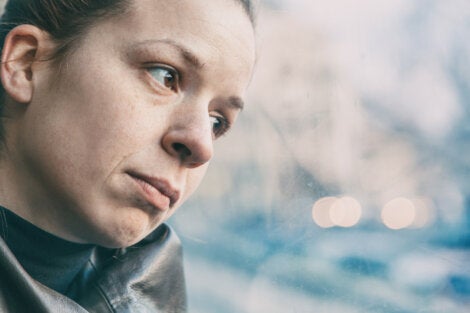Why Does it Feel Like no One Cares about Me?


Written and verified by the psychologist Valeria Sabater
Why does it feel like no one cares about me? This kind of thought is like an emotional slap in the face. It plunges you right down into a state of unease and corrosive loneliness that upsets your mental balance. There’s nothing quite as destructive as thinking that no one loves you, appreciates you, or values you.
If you find yourself thinking these thoughts or someone says something like this to you, it’s important to first evaluate the situation. People who say things like this are often suffering from depression. This negative and bitter self-talk is definitely a possible sign of that.
On the other hand, we can’t ignore reality. Society is becoming a lonelier and lonelier place. Younger generations and older adults alike report feeling more alone every year. Feeling like you don’t matter to anyone might mean you lack a solid, close, and meaningful social circle. Let’s delve right in.

Why does it feel like no one cares about me?
When someone asks themselves, “Why do I feel like no one cares about me?” they’re experiencing a significant degree of suffering. It’s important not to ignore what they’re saying. These kinds of comments can be painful for those who do love, appreciate, and value them. However, instead of getting angry or reproachful, there are a few things you should keep in mind.
The first thing is that this person might be going through a difficult time in their life. The second is that the feeling may be real and the people involved in the speaker’s life aren’t as involved as they should be. That’s why it’s so important to analyze the context and have the courage to examine these difficult situations.
Fragile connections and true loneliness
The University of Pennsylvania conducted a study in 2016 to try to evaluate what people mean when they say they “feel loved”. The results showed that people have very different ideas about what it means to be loved, respected, and validated. However, there are some common factors:
- Feeling safe and secure. If you feel like the love you have in your life is constant and there aren’t ups and downs. You don’t feel like people only love you part of the time. This is key.
- Another important element is communication. When someone tells you what you mean to them, it makes you feel safe.
One of the reasons why people sometimes feel like no one cares is because they have fragile relationships. One example of a fragile relationship would be with a family member who says they love you but isn’t around when you actually need them. In addition, friends who judge you more than they support you or significant others who don’t stick around or who make you feel alone even when they’re there.
The weight of unhealed trauma
Many people are carrying around the burden of psychological trauma, which can exacerbate their perception of loneliness. If you don’t learn to manage and treat that pain, it makes it complicated to have solid relationships.
Not only that, but people with past trauma often demand far too much of their partners in a desperate attempt to use the relationship to heal their old wounds. Unsurprisingly, this doesn’t always work.
Studies such as this one from Tilburg University have found that people with post-traumatic stress disorder often feel chronically lonely.
Invisible depression
If you find yourself asking, “Why does it feel like no one cares about me?” often and over a long period of time, it’s possible that you may have depression. It can be hard for some people to identify their own depression because they get used to their suffering. Instead of seeking help, you drag your frustration, sadness, bitterness, and loneliness around for months.
It’s important to know and recognize the symptoms of depression so you can get professional help. The most common are:
- A lack of motivation, no longer taking pleasure in the things that used to interest you.
- Physical exhaustion.
- Sleep problems such as insomnia or oversleeping.
- Feeling angry, frustrated, or desperate.
- Feeling lonely and guilty at the same time.
- Needing to be isolated from others.
- Negative thought patterns.
Why does it feel like no one cares? The low self-esteem mantra
These kinds of thoughts can also point to low self-esteem and self-worth levels. In other words, if you don’t appreciate and value yourself, you’re not going to feel like you deserve love. This can be extremely problematic if it goes too far.
Low self-esteem often ends relationships. That’s because it promotes insecurity and irrational beliefs that have the potential to ruin emotional bonds.
What can I do when I feel this way?
If you’re asking yourself why no one cares about you, try to remember to look for the root cause, whatever is going on behind this thought. Try to clarify what you’re feeling and what’s going on in life that’s leading you to feel this way.
- If your problem is loneliness and a lack of meaningful relationships, you might have to make some changes. The good thing today is that modern technology gives us the tools to meet people very easily. You can find people who have the same interests as you and talk to them online.
- Try to remember that you’re worthy of authentic love. You deserve to be valued, taken care of, and acknowledged. If the people around you are making you feel like you don’t deserve that, it’s probably time to make some tough decisions.
- Before dealing with the quality of your relationships, you have to address your own low self-esteem. When you value and appreciate yourself, you’ll feel worthy not only of being loved but of being loved in the best way possible.
Last but not least, if you feel alone even though there are people in your life who care about you, you should see a mental health care professional. Sometimes the marks left by unresolved trauma distort the idea you have of yourself.
All cited sources were thoroughly reviewed by our team to ensure their quality, reliability, currency, and validity. The bibliography of this article was considered reliable and of academic or scientific accuracy.
- Oravecz Z, Muth C, Vandekerckhove J (2016) Do People Agree on What Makes One Feel Loved? A Cognitive Psychometric Approach to the Consensus on Felt Love. PLoS ONE 11(4): e0152803. https://doi.org/10.1371/journal.pone.0152803
- van der Velden, P. G., Pijnappel, B., & van der Meulen, E. (2018). Potentially traumatic events have negative and positive effects on loneliness, depending on PTSD-symptom levels: evidence from a population-based prospective comparative study. Social Psychiatry and Psychiatric Epidemiology, 53(2), 195–206. https://doi.org/10.1007/s00127-017-1476-8
This text is provided for informational purposes only and does not replace consultation with a professional. If in doubt, consult your specialist.








